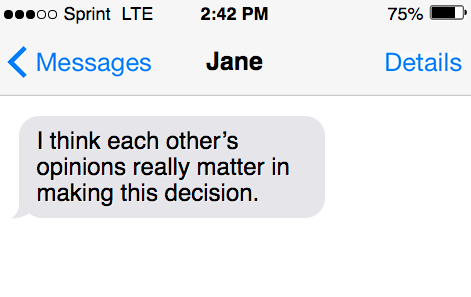Is it other’s or others’? Using the apostrophe in the English language typically provides pluralization to the word that it is modifying. Adding an apostrophe can suggest that there is possession. And many amounts of certain things. For example, “Sonia’s book is missing.” In this sentence, the possession of the book is to Sonia, the person. This is how an apostrophe can modify singular nouns. An apostrophe can also modify compound nouns and create joint or separate possession.
Learn which word form is correct in this short guide…
Why is there confusion between other’s and others’?
Making the word “other” plural can be challenging because it varies based on the way the word is getting used in a common sentence. For example, when we say “each other’s work” it is a singular pluralization of the word form. When we say “consider other’s opinions,” we use “others'” with the apostrophe at the end with no additional “s” letter, because there are many opinions we are referring to.
How to use the apostrophe correctly
The possessive singular noun is made by adding an apostrophe and the letter “s” to the singular noun in question, regardless of whether the singular noun ends in an “s” letter.
When a plural noun has an “s” at the end, the possessive form of the noun is created by simply adding an apostrophe. When the noun ends in any other letter, the possessive form is made by adding both an apostrophe and an “s.”
| Form | Example |
| Singular noun | Sarah’s |
| Plural noun | Women’s |
| 2 or more people | Kim and Adam’s |
| Singular noun ending in “s” | James’s and James’ |
| Plural noun ending in “s” | Parent’s |
| 2+ people | Kim’s and Adam’s |
| Apostrophe for Possessives | Apostrophe for Contractions |
| Amy’s swim class | they + have = they’ve |
| Karen’s car | are + not = aren’t |
| Robert’s vehicle | they + will = they’ll |
“Other” definition
Let’s take a look at the definition of “other.”
| Word | Definition |
| Other (adjective) /ˈəT͟Hər/ | denoting a person or thing that is different or distinct from one already mentioned or known about. |
Which is correct? Other’s or others’?
Here is a simple breakdown of which word form is correct. For examples of each word form in an English sentence, scroll down to the next section.
| Word | Correct or incorrect |
| Other’s | Correct: We want to see each other’s results. |
| Others’ | Correct: How many others’ opinions do we need to survey? |
Key differences
Think about it like you are referring to “each other” (singular). In that case the word “other’s” is correct. It is like you are saying “each other’s.” With the plural form being others’.

Other’s sentence examples
Below are sentence examples using the word form correctly:
- Can we see each other’s test results tomorrow?
- I think each other’s opinions really matter in making this decision.
Others’ sentence examples
Below are sentence examples using the word form correctly:
- How many of the others’ thoughts and opinions really matter in making this decision?
- Are there many others’ thoughts that need to be considered when we decide which insurance plan we choose?
How to remember which word form to use
To remember which word form to use, try to remember how many things you are referring to. What the count of those are. For example, if there are many of the “other’s” things that are getting referred to, then use others’. If you are only referring to one object, then use other’s.
Here is a simple trick to remember apostrophe rules:
Use apostrophe + “s” with nouns that don’t end in “s”. When a singular noun has possession over another noun (such as Sarah’s hat or mom’s cat), add an apostrophe + “s” to the end of the noun. The same rules apply for collective nouns and plural nouns that don’t end in the “s” letter.
Common questions
Questions and answers about the English language.
Is “each other’s” correct?
Yes. “Each other’s” is the correct singular form of the word “other” in that phrase.
Inside this article
Fact checked:
Content is rigorously reviewed by a team of qualified and experienced fact checkers. Fact checkers review articles for factual accuracy, relevance, and timeliness. Learn more.
Core lessons
Glossary
- Abstract Noun
- Accusative Case
- Anecdote
- Antonym
- Active Sentence
- Adverb
- Adjective
- Allegory
- Alliteration
- Adjective Clause
- Adjective Phrase
- Ampersand
- Anastrophe
- Adverbial Clause
- Appositive Phrase
- Clause
- Compound Adjective
- Complex Sentence
- Compound Words
- Compound Predicate
- Common Noun
- Comparative Adjective
- Comparative and Superlative
- Compound Noun
- Compound Subject
- Compound Sentence
- Copular Verb
- Collective Noun
- Colloquialism
- Conciseness
- Consonance
- Conditional
- Concrete Noun
- Conjunction
- Conjugation
- Conditional Sentence
- Comma Splice
- Correlative Conjunction
- Coordinating Conjunction
- Coordinate Adjective
- Cumulative Adjective
- Dative Case
- Determiner
- Declarative Sentence
- Declarative Statement
- Direct Object Pronoun
- Direct Object
- Diction
- Diphthong
- Dangling Modifier
- Demonstrative Pronoun
- Demonstrative Adjective
- Direct Characterization
- Definite Article
- Doublespeak
- False Dilemma Fallacy
- Future Perfect Progressive
- Future Simple
- Future Perfect Continuous
- Future Perfect
- First Conditional
- Irregular Adjective
- Irregular Verb
- Imperative Sentence
- Indefinite Article
- Intransitive Verb
- Introductory Phrase
- Indefinite Pronoun
- Indirect Characterization
- Interrogative Sentence
- Intensive Pronoun
- Inanimate Object
- Indefinite Tense
- Infinitive Phrase
- Interjection
- Intensifier
- Infinitive
- Indicative Mood
- Participle
- Parallelism
- Prepositional Phrase
- Past Simple Tense
- Past Continuous Tense
- Past Perfect Tense
- Past Progressive Tense
- Present Simple Tense
- Present Perfect Tense
- Personal Pronoun
- Personification
- Persuasive Writing
- Parallel Structure
- Phrasal Verb
- Predicate Adjective
- Predicate Nominative
- Phonetic Language
- Plural Noun
- Punctuation
- Punctuation Marks
- Preposition
- Preposition of Place
- Parts of Speech
- Possessive Adjective
- Possessive Determiner
- Possessive Case
- Possessive Noun
- Proper Adjective
- Proper Noun
- Present Participle
- Prefix
- Predicate



